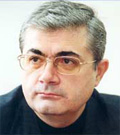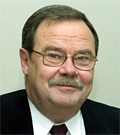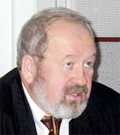 |
 |
 |
 |
|
Yuri
Poluneev
|
Volodymyr
Mostovyi
|
Ivan
Dziuba
|
Vyacheslav
Briukhovetsky
|
 Yuri Poluneev
Yuri Poluneev
Head of the Council on Competitiveness of Ukraine, the initiator of its establishment. Dr. Yuri Poluneev was appointed the President of the International Management Institute (MIM-Kyiv) as of January 1, 2006. Dr. Poluneev held post of the Executive Director for Ukraine, Romania, Moldova, Georgia, Armenia for the European Bank for Reconstruction and Development in London in 1996 through 2005. His professional record also features his key positions in the Administration of the President of Ukraine (Kyiv), International Committee for Economic Reform and Cooperation (Bonn, Germany), Organization for Economic Cooperation and Development (OECD, Ukraine, France), International Management Institute MIM-Kyiv, and in the National Academy of Science of Ukraine (Ukraine).
Within the framework of his professional and scientific interests Mr Poluneev worked on the improvement of the investment climate of Ukraine, on the strategy of economic development and market reforms, on the country’s competitiveness, collaborated with international financial institutions, assisted in developing state policies in finance, in the external debt management, etc.
Mr. Poluneev is the author of more than 80 national and international publications, including books, articles, researches and various international conference papers. He is also a co-author of five academic monographs on the financial aspects of the energy crisis, on energy and economic security, on international business and finance, etc. In 1988 he received an award of the National Academy of Sciences of Ukraine to Young Researchers for the Best Series of Research publications on International Economics.
 Volodymyr Mostovyi
Volodymyr Mostovyi
Editor-in-Chief of the international social and political weekly paper “Dzerkalo Tyzhnia”. In 2002, Mr. Mostovyi was awarded with the title “Media Manager of the Year” at the international journalist festival “Vira. Nadiya. Liubov”. In 2003, he was awarded with the second prize of the German media fund “Sparkasse Leipzig” for freedom and future of mass media. Since 2001, Mr. Mostovyi is Chairman of the Journalist Ethics Commission.
In 1997, Dzerkalo Tyzhnia Weekly won in the National Program “Person of the Year 96” in the nomination “Newspaper of the Year”, and in 1998, it became the Program’s laureate. Also in 1998, the newspaper won the title “National Recognition” at the Ukrainian National Journalist Festival. In 2000, Dzerkalo Tyzhnia Weekly won the first prize as the best newspaper of the year and the highest journalist award — “Golden Pen” at the National Media Competition. In 2001, the Zeit Stiftung Fund awarded the newspaper with Gerd Buzerius Prize “Young Press of Eastern Europe”. In 2005, the paper opened a new column entitled “Ukraine Competitive”.
Participation of a media representative in the Council on Competitiveness of Ukraine is extremely important due to the importance of national competitiveness for the society. It is media that serves as a tool to elevate competitiveness to the level of national consciousness.
 Ivan Dziuba
Ivan Dziuba
Member of the National Academy of Sciences of Ukraine (Section of Literature, Language and Art History; Literature Studies, 1992), Head of Taras Shevchenko National Prizes Committee (since 1999), Head of Editorial Board of Suchasnist Journal (since 1991); editor in chief of the Modern Ukraine Encyclopedia; member of State Prizes Committee in science and technology (since 1997). Laureate of O. Biletsky Prize (1987), T. Shevchenko National Prize (1991), Antonovych International Prize (1992), V. Zhabotynsky Prize (1996). Mr. Dziuba is awarded with the Order of State and title of Hero of Ukraine (2001). In 1999, he was awarded with St. Michael Order. In 1992—1994 — Minister of Culture of Ukraine. Author of books: “Common Man or Bourgeois?” (1959), “Internationalism or Russianization” (1968), “Planes of a Crystal” (1978), “Stefan Zorian in the History of Armenian Literature” (1982), “Autographs of Renaissance” (1986), “Sadriddin Aini” (1987), “Each One Has His Fate” (1989), “More than the Sound of Speech” (1990), “Poor Freedom has Been Caught…” (1995), “Between Culture and Politics” (1998), “Thirst” (2001), “Trap” (2003) and others.
National Academy of Sciences of Ukraine is a higher state scientific organization of Ukraine of full members, correspondent members and foreign fellows. The Academy unites all scholars in its institutions who conduct research in various areas, develop scientific basis for the country’s technological, socioeconomic and cultural development. The Academy has the national status and self-government rights in decision-making as to its internal issues in accordance with the Charter.
The National Academy consists of three sections comprising 13 subsections of sciences and arts: mathematics; informatics; mechanics; physics and astronomy; geosciences; physical and technological problems of materials science; physical and technological problems of energy science; chemistry; molecular biology; biochemistry, experimental and clinic physiology; general biology; economics; history, philosophy and law; literature, language and art history. The Academy has 6 regional research centers subordinated also to the Ministry of Education and Science of Ukraine. The Academy’s key chain consists of research institutes and other similar scientific research establishments. They operate according to their charters approved and registered by the National Academy of Sciences of Ukraine.
During the years of Ukraine’s transition to market economy, the National Academy scholars developed dozens of new technologies to support the state and domestic production of competitive science-driven products.
The National Academy of Sciences takes many efforts for the development of international scientific relations and integration in the world’s scientific community. The Academy’s institutions actively participate in joint research works based on direct bilateral agreements with foreign scientific organizations and on grants of numerous scientific funds and programs.
Participation of a scholar is important for the functioning of the Council on Competitiveness of Ukraine as its innovation potential necessary for ongoing improvement of competitiveness in the global context is formed due to science, research and development by domestic scholars.
 Vyacheslav Briukhovetsky
Vyacheslav Briukhovetsky
President of the National University Kyiv Mohyla Academy (NaUKMA). Mr. Briukhovetsky is a distinguished activist in the area of education, member of the Ukrainian National Union of Writers since 1982, awarded with Orders “For Merit”, III Class (1997) and St. Volodymyr the Great (1998), and the medal of the Public Education Commission of the Polish Republic (1996). He is Laureate of the “Recognition Prize” (2001), author of more than 300 publications including monographs: “Ivan Senchenko” (1981), “Force Field of Critics” (1984), “Critics in Contemporary Literature Process” (1985), “Specifics and Functions of the Literature and Critics Work” (1986), “Lina Kostenko” (1990), “Mykola Zerov” (1991) and others.
Kyiv Mohyla Academy is one of the oldest universities in Eastern Europe. Its foundation dates back to 1615 when Kyiv Fraternity School was opened. In 1991, it was revived in its historic territory as the University “Kyiv Mohyla Academy” with first students to enter it in 1992. NaUKMA’s curricula and training planes were approved by the special board of UNESCO experts on 22—23 May 1993. The university was granted the national status in 1994. 30 June 1994, the Inter-Sector Accreditation Commission licensed NaUKMA with the fourth (highest) accreditation level. NaUKMA’s mission is to assist personal realization of students, professors and employees to develop highly educated personalities with sense of national identification, that are capable of thinking and acting according to the principles of goodness and justice. NaUKMA’s goal is to provide contemporary education through free creative learning and scientific activity in accordance with social needs preconditioned by the development of the Ukrainian state, science, economy and culture, as well as global process of the human civilization’s development. High competitiveness of NaUKMA’s graduates is due to their broad and open thinking, profound special and comprehensive knowledge and practical skills, activeness, initiative and responsibility for the decisions made. According to various expert surveys and ratings, NaUKMA is one of three top universities of Ukraine.
Participation of an academic representative is undoubtedly important for the functioning of the Council on Competitiveness of Ukraine as education is one of the moving forces of competitiveness for any country.







